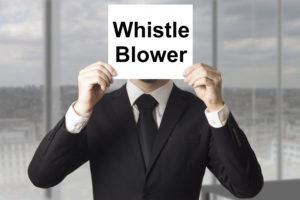Federal Whistleblower Protection & Representation
 When as a federal employee you report a violation of law, a gross waste of funds or mismanagement, an abuse of authority, or a substantial danger to public health or safety, you become a whistleblower. Whistleblowing is seen as essential to the functioning of an honest and efficient government, and as a result numerous bi-partisan federal laws have been enacted to protect whistleblowers and encourage whistleblowing activity. At Leitner Varughese Warywoda Law, we think of whistleblowers as modern-day heroes, and our attorneys are committed to helping federal employees report wrongdoing by their agencies and protecting them from any type of retaliation for doing so.
When as a federal employee you report a violation of law, a gross waste of funds or mismanagement, an abuse of authority, or a substantial danger to public health or safety, you become a whistleblower. Whistleblowing is seen as essential to the functioning of an honest and efficient government, and as a result numerous bi-partisan federal laws have been enacted to protect whistleblowers and encourage whistleblowing activity. At Leitner Varughese Warywoda Law, we think of whistleblowers as modern-day heroes, and our attorneys are committed to helping federal employees report wrongdoing by their agencies and protecting them from any type of retaliation for doing so.
What Is The Whistleblower Protection Act?
When a federal employee discloses what they reasonably believe to be evidence of government wrongdoing, they immediately fall under the protection of the Whistleblower Protection Act of 1989. Under the Act, protections were put in place so that federal employees can report government activity they believe may be illegal or unethical without fear of retaliation.
Some activities the employee may report or provide evidence on include:
- A gross waste of funds
- A violation of any regulation, rule, policy, or law
- A specific and substantial danger to public safety or health
- Gross mismanagement
- Abuse of authority
- Also, censorship of analysis, research, or technical information which will cause or causes gross government mismanagement or waste, specific and substantial danger to public safety and health, abuse of authority, or violation of any statute or law.

In November 2012, Congress enacted the enhanced Whistleblower Protection Enhancement Act of 2012 law. This Act substantially strengthened the protections given to a federal whistleblower under the original Act of 1989. It also recognized whistleblowers as a critical element in helping to expose abuse, fraud, mismanagement, waste, and public safety threats to safety and health across the entire Federal government. In addition, it asserted that whistleblowing disclosures can save billions of dollars and countless human lives.
Further, the Enhancement Act also provided clarification on situations regarding protected disclosure. Specifically, it stated that a federal whistleblower may not lose protection when:
- They make the disclosure to a person who took part in the disclosed wrongdoing. This can include a supervisor.
- The employee was off-duty when making the disclosure.
- Information in the disclosure had already been disclosed.
- The employee’s motive for disclosing is questioned.
If you reported Whistleblowing Activity and are facing Retaliation as a result, LVW Law is Here To Help
If you are a federal employee who disclosed information regarding government wrongdoing and feel you are facing retaliation, you need legal representation. The attorneys at LVW Law have been protecting federal employee whistleblowers from retaliation. We have the experience and expertise it takes to fight on your behalf and ensure you receive all appropriate legal protections. Please feel free to contact us by phone at 888.594.0424, or fill out the form on the right hand side of this page and we will be in touch promptly.
What Types of Retaliation Are Whistleblowers Protected Against?
From a public policy perspective, federal whistleblowing is seen as an effective tool in keeping government accountable. According to the Government Accountability Project:
Whether the issue is food safety or financial integrity, disclosures made by whistleblowers are one of the most effective tools to promote government and corporate accountability.
That being said, employers don’t always appreciate whistleblowing, and whistleblowers may find themselves facing retaliation including:
- Harassment
- Poor performance reviews
- Reductions in job responsibilities
- Termination
- Threats of criminal investigation or prosecution
Common Questions & Answers about Whistleblower Protection
Q. If my employer retaliates against me for whistleblowing, how can my lawyer protect me?
 Federal whistleblower attorneys file your lawsuit confidentially. A. It is illegal for your employer to demote, harass, discharge, threaten, suspend, or discriminate against you in any way for filing a whistleblower claim. If your employer retaliates, your attorney may file a lawsuit, an Individual Right of Action (IRA) on your behalf against your employer. If you are terminated, they can seek reinstatement and get you back pay (double the amount lost).
Federal whistleblower attorneys file your lawsuit confidentially. A. It is illegal for your employer to demote, harass, discharge, threaten, suspend, or discriminate against you in any way for filing a whistleblower claim. If your employer retaliates, your attorney may file a lawsuit, an Individual Right of Action (IRA) on your behalf against your employer. If you are terminated, they can seek reinstatement and get you back pay (double the amount lost).
Q. When false claims are submitted to the Federal government, what are the potential civil penalties and damages the government can incur?
A. A whistleblower lawsuit can hold the person, individual, or company defrauding the government liable. Also, it can require them to pay three times the fraud amount. This amount in added to a civil penalty ranging from $5,500 to $11,000 per claim. Medicaid fraud can carry a very large civil penalty because each fraudulent Medicare invoice requires a separately filed claim.
Q. Can I keep my whistleblower lawsuit a secret or can I disclose anonymously?
A. A whistleblower lawsuit is a confidential filing. The general public as well as the accused (which may be your employer) will not be able to view it. The accused will also not learn an investigation is ongoing or who made the claims starting the investigation. The whistleblower’s name will not become public, even if the government does not choose to litigate a specific claim. There are some cases, though, where the whistleblower’s name must become public. This includes instances when the investigation cannot move forward without the revelation of the whistleblower’s identity, or when they are vital in the judicial proceedings (as a witness or other key party). Even if the whistleblower’s identity becomes known, there are still laws to protect them from retaliation.
We Are Here to Help You

At LVW Law, our federal employment attorneys are well-versed in all aspects of whistleblower protection. We are here to help protect your rights should you need to blow the whistle, or if you face retaliation for it. As attorneys representing whistleblowers, we have presented claims to the IG and Office of Special Counsel (OSC), pursued claims of Whistleblower Retaliation at OSC, and as an Individual Right of Action at the Merit Systems Protection Board (MSPB). We will work tirelessly to help you achieve a positive outcome. If you believe your employer is retaliating against you for whistleblowing, or you want to blow the whistle, give us a call at (888) 594-0424 or fill out the contact form on your right, and we will be in touch with you promptly.
